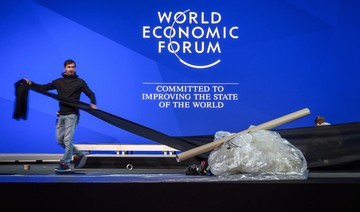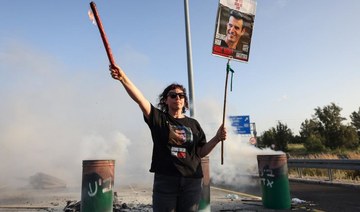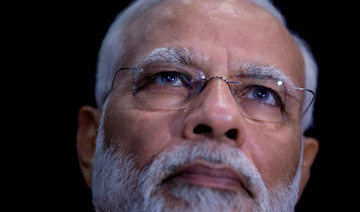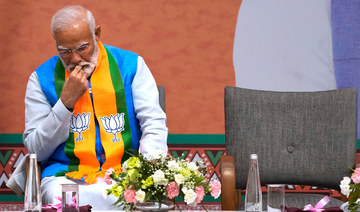DAVOS, Switzerland: People around the world place much more trust in their companies than their political leaders, according to a major survey that suggests a mood of uncertainty and pessimism on the eve of the World Economic Forum in Davos.
The annual Edelman Trust Barometer shows only one in five people believe the economic, political and social system is working for them, while nearly 60 percent think trade conflicts are hurting their companies and putting their jobs at risk.
The sense of gloom is strongest in developed markets led by Japan, where 84 percent of the general public — excluding the ‘informed public’ who are college-educated, earn above-average incomes and consume news regularly — do not believe they will be better off in five years’ time, followed by France at 79 percent, Germany at 74 percent and Britain at 72 percent. That is far above the average 49 percent of the 27 countries examined in the research.
Amid low confidence that politicians will fix the problems, these people are turning to companies, with 75 percent saying they trust “my employer,” compared to 48 percent for government and 47 percent for the media.
“CEOs now have to be visible, show personal commitment, absolutely step into the void, because we’ve got a leadership void in the world,” Richard Edelman, head of the communications marketing firm that commissioned the research, told Reuters.
Optimism was higher in the United States, where nearly half of the general public believed they would be better off in the next five years. The corresponding figure there was 62 percent for the better-educated, higher-earning “informed public.”
“The stock market was very good, the deregulation and lower taxes for the wealthy — it’s pretty good if you are an elite,” Edelman said of the US findings.
The survey, based on the opinions of over 33,000 people and conducted between Oct. 19 and Nov. 16, is published on the eve of the Davos gathering in the Swiss Alps, which this year brings together some 3,000 business and world leaders amid anxiety over the US-China trade war, Brexit and a slowdown in global growth.
“Violation of trust“
The pessimism in Japan, France, Germany and Britain reflects a variety of factors.
“I think Japan’s never really recovered from Fukushima, there was such a violation of trust when that happened,” said Edelman, referring to the authorities’ botched response to a massive nuclear accident in 2011.
Signs of slowing global demand and a sharp rise in the yen have clouded the outlook for Japan’s export-reliant economy, and the government plans tax hikes to pay for ballooning health care costs for its rapidly aging population.
“The problem for the three (European) countries.... is that given the reality of the potentially diminished economic future, there is deep anger in advance,” Edelman said.
In France, what started as a grassroots rebellion by low-paid workers to protest taxes on diesel fuel and a squeeze on household incomes has morphed into an assault on President Emmanuel Macron and his reforms, seen by the protesters as favoring the wealthy.
And in Britain, the Brexit crisis intensified last week after Prime Minister Theresa May’s two-year attempt to forge an amicable divorce from the European Union was crushed by parliament in the biggest defeat for a British leader in modern history.
The survey found that while only 49 percent of the wider population trusted institutions such as governments, this figure rose to 65 percent among high-income, college-educated and well-informed people — the biggest gap since the research began 19 years ago.
Despite widespread distrust of the media, uncertainty about the future has led to a sharp jump in people’s consumption and sharing of news and information, up 22 percentage points in a year to 72 percent.
But more than 70 percent said they worry about false information or fake news being used as a weapon.
In the United States, where President Donald Trump has repeatedly denounced the media as purveyors of fake news, trust in media varied widely depending on political affiliations.
Those who identified themselves as Republican voters showed only 33 percent trust in media, while 69 percent of Democrats did so.
Eve-of-Davos survey shows people place trust in companies over governments
Eve-of-Davos survey shows people place trust in companies over governments

- Only one in five people believe the economic, political and social system is working for them
- Nearly 60 percent think trade conflicts are hurting their companies and putting their jobs at risk
Biden to host Jordan king next week amid Gaza talks

- Hamas accused Israeli Prime Minister Benjamin Netanyahu on Friday of trying to derail the proposed Gaza deal with his threats to launch an operation in Rafah
- Israel has killed more than 34,000 Palestinians in Gaza, mostly women and children, according to the health ministry in the Hamas-run territory
WASHINGTON: US President Joe Biden will host Jordan’s King Abdullah II next week, the White House said Friday, as negotiations continue in the Middle East for a ceasefire in Gaza.
The meeting will be “private” and will be followed by a readout, White House Press Secretary Karine Jean-Pierre told reporters, without giving a date for the encounter.
The meeting comes against the backdrop of talks for a deal to release hostages and secure a ceasefire between Israel and Hamas in Gaza after nearly seven months of war.
The talks, which come after months of efforts by mediators Egypt, Qatar and the United States to broker a new agreement between the combatants, are at a critical juncture.
The United States has urged the Palestinian militant group to accept the “extraordinarily generous” offer.
But Hamas accused Israeli Prime Minister Benjamin Netanyahu on Friday of trying to derail the proposed Gaza deal with his threats to launch an operation in Rafah.
King Abdullah II last visited the White House in February when he called for an immediate ceasefire and warned an attack on Rafah would cause a “humanitarian catastrophe.”
In April, Jordan worked alongside the United States and other allies to shoot down Iranian drones that Tehran sent toward Israel, with the kingdom keen to avoid a wider conflict.
Austin: No indication Hamas planning attack on US troops

- Israel has killed more than 34,000 Palestinians, according to Gaza’s Health Ministry
WASHINGTON: US Defense Secretary Lloyd Austin said he did not see any indication Hamas was planning any attack on US troops in Gaza but added adequate measures were being put in place for the safety of military personnel.
“I don’t discuss intelligence information at the podium. But I don’t see any indications currently that there is an active intent to do that,” Austin said during a press briefing.
“Having said that ... this is a combat zone and a number of things can happen, and a number of things will happen.”
Austin’s remarks came as the US military said it was temporarily pausing the offshore construction of a maritime pier because of weather conditions and instead would continue building it at the Israeli Port of Ashdod.
FASTFACT
The US military says it is temporarily pausing the offshore construction of a maritime pier because of weather conditions.
The maritime pier, once built, will be placed off the coast of Gaza in a bid to speed the flow of humanitarian aid into the enclave.
“Forecasted high winds and high sea swells caused unsafe conditions for soldiers working on the surface of the partially constructed pier,” the US military said in a statement.
“The partially built pier and military vessels involved in its construction have moved to the Port of Ashdod, where assembly will continue,” it added.
Earlier this week, the Pentagon said about 50 percent of the pier had been constructed.
Israel has sought to demonstrate it is not blocking aid to Gaza, especially since President Joe Biden issued a stark warning to Prime Minister Benjamin Netanyahu, saying Washington’s policy could shift if Israel fails to take steps to address civilian harm, humanitarian suffering, and the safety of aid workers.
US officials and aid groups say some progress has been made but warn it is insufficient, amid stark warnings of imminent famine among Gaza’s 2.3 million people.
The humanitarian situation in Gaza — which has been devastated by more than six months of Israeli operations against Hamas — remains dire, with a senior US administration official saying last week that the territory’s entire population of 2.2 million people is facing food insecurity.
Canada police charge three with murder of Sikh leader Nijjar

- Nijjar was a Canadian citizen campaigning for the creation of Khalistan, an independent Sikh homeland
OTTAWA: Canadian police said on Friday they had arrested and charged three Indian nationals with the murder of Sikh separatist leader Hardeep Singh Nijjar in June 2023 and said they were probing possible links to the Indian government.
Nijjar, 45, was shot dead outside a Sikh temple in Surrey, a Vancouver suburb with a large Sikh population. Canadian Prime Minister Justin Trudeau has cited evidence of Indian government involvement, prompting a diplomatic crisis with New Delhi.
Assistant Commissioner David Teboul said the matter was still under investigation and other probes were being carried out. These “include investigating connections to the government of India,” he told a televised news conference.
Nijjar was a Canadian citizen campaigning for the creation of Khalistan, an independent Sikh homeland carved out of India. The presence of Sikh separatist groups in Canada has long frustrated New Delhi, which had labeled Nijjar a “terrorist.”
Last week the White House expressed concern about the reported role of the Indian intelligence service in assassination plots in Canada and the United States.
India’s Rahul Gandhi to contest elections from family borough

- Gandhi contests polls from second seat in family bastion
- Emotional moment to contest from Raebareli, Gandhi says
NEW DELHI: Indian opposition leader Rahul Gandhi will contest the general election from the family bastion in the north, his Congress Party announced on Friday, a move that will challenge Prime Minister Narendra Modi in a region he dominates.
Gandhi, the scion of the Nehru-Gandhi dynasty, will contest from Raebareli in politically crucial Uttar Pradesh state, Congress said, in addition to Wayanad in Kerala state in the south, which has already voted. India allows candidates to contest multiple constituencies but they can represent only one.
Uttar Pradesh is India’s most populous state and elects 80 lawmakers to the lower house of parliament, the most of any state. In the last election in 2019, Modi’s Bharatiya Janata Party and allies won 64 seats, including from Amethi, adjacent to Raebareli, where Gandhi was defeated.
His return to the area, albeit for a second constituency, will invigorate the party, Congress officials said.
Gandhi said being nominated from Raebareli was an “emotional moment” for him.
“My mother has entrusted me with the responsibility ... with great confidence and given me the opportunity to serve it,” he posted on X.
“In the ongoing battle for justice and against injustice, I seek the love and blessings of my loved ones. I am confident that all of you are standing with me in this battle to save the constitution and democracy,” he said.
Gandhi’s mother Sonia won from Raebareli in 2019, which has returned a Congress candidate in 17 of the 20 elections held there since 1952, mostly members of the Gandhi family. Sonia Gandhi is now a member of the upper house of parliament.
Modi is widely expected to win a rare third term in the general election that got underway on April 19 and concludes on June 1, with votes set to be counted on June 4.
However, analysts say a low voter turnout in the first two phases of the seven-phase election has dampened hopes of a huge majority for the party, although they said the BJP was still likely to retain power in the world’s most populous nation.
Soon after the announcement, Gandhi flew to Raebareli in a private aircraft, accompanied by his mother Sonia, sister Priyanka and senior Congress leaders, and filed his nomination papers.
Modi and the BJP attacked Gandhi for the decision.
“I had said that the prince will lose in Wayanad and in fear of his loss ... he will look for another seat,” Modi said on Friday, referring to Gandhi.
“I also want to tell them wholeheartedly, do not be afraid, do not run away,” Modi said.
Congress has ruled India for 54 of its 76 years since independence from Britain, and members of the Nehru-Gandhi family were prime ministers for more than 37 of those 54 years.
However, the party has floundered since it was swept out of power by Modi in 2014 and has been struggling to revive itself.
Gandhi contesting from Raebareli is good news for the opposition INDIA alliance of 27 parties that Congress leads, said Rasheed Kidwai, political analyst and visiting fellow at New Delhi’s Observer Research Foundation.
“The significance of Rahul contesting here is that it will boost the alliance with Samajwadi Party,” Kidwai said referring to the regional partner of Congress in Uttar Pradesh. “The opposition story is not all that bad and this will force a contest with BJP.”
Defense chiefs from US, Australia, Japan and Philippines vow to deepen cooperation

- Defense chiefs from the four nations held their first meeting in Singapore last year
HONOLULU: Defense chiefs from the US, Australia, Japan and the Philippines vowed to deepen their cooperation as they gathered Thursday in Hawaii for their second-ever joint meeting amid concerns about China’s operations in the South China Sea.
The meeting came after the four countries last month held their first joint naval exercises in the South China Sea, a major shipping route where Beijing has long-simmering territorial disputes with a number of Southeast Asian nations and has caused alarm with its recent assertiveness in the waters.
US Defense Secretary Lloyd Austin told reporters at a news conference after their discussion that the drills strengthened the ability of the nations to work together, build bonds among their forces and underscore their shared commitment to international law in the waterway.
HIGHLIGHT
The meeting came after the four countries last month held their first joint naval exercises in the South China Sea, a major shipping route where Beijing has long-simmering territorial disputes with a number of Southeast Asian nations and has caused alarm with its recent assertiveness in the waters.
Australian Defense Minister Richard Marles said the defense chiefs talked about increasing the tempo of their defense exercises.
“Today, the meetings that we have held represent a very significant message to the region and to the world about four democracies which are committed to the global rules-based order,” Marles said at the joint news conference with his counterparts.
Austin hosted the defense chiefs at the US military’s regional headquarters, US Indo-Pacific Command, at Camp H.M. Smith in the hills above Pearl Harbor. Earlier in the day, Austin had separate bilateral meetings with Australia and Japan followed by a trilateral meeting with Australia and Japan.
Defense chiefs from the four nations held their first meeting in Singapore last year.
The US has decades-old defense treaties with all three nations.
The US lays no claims to the South China Sea, but has deployed Navy ships and fighter jets in what it calls freedom of navigation operations that have challenged China’s claims to virtually the entire waterway. The US says freedom of navigation and overflight in the waters is in America’s national interest.
Aside from China and the Philippines, Vietnam, Malaysia, Taiwan and Brunei also have overlapping claims in the resource-rich sea. Beijing has refused to recognize a 2016 international arbitration ruling that invalidated its expansive claims on historical grounds.
Skirmishes between Beijing and Manila in particular have flared since last year. Earlier this week, Chinese coast guard ships fired water cannons at two Philippine patrol vessels off off Scarborough Shoal, damaging both.
The repeated high-seas confrontations have sparked fears of a larger conflict that could put China and the United States on a collision course.. The US has warned repeatedly that it’s obligated to defend the Philippines — its oldest treaty ally in Asia — if Filipino forces, ships or aircraft come under an armed attack, including in the South China Sea.
President Joe Biden’s administration has said it aims to build what it calls a “latticework” of alliances in the Indo-Pacific even as the US grapples with the Israel-Hamas war and Russia’s ongoing invasion of Ukraine.
Beijing says the strengthening of US alliances in Asia is aimed at containing China and threatens regional stability.




















